Why property tax reforms fail: Lessons from Tanzania
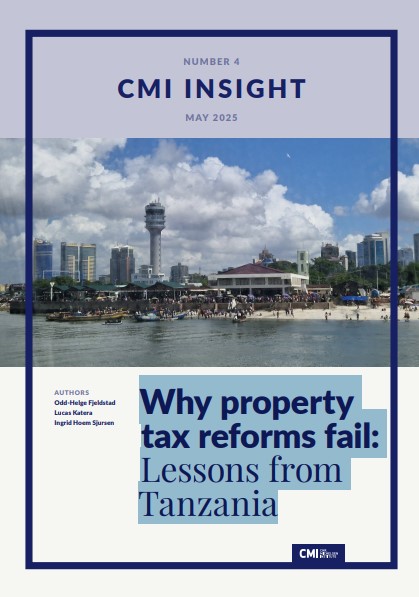
Over the past two decades, property tax administration in Tanzania has undergone substantial changes, shifting between decentralized and centralized collection models. However, despite numerous reform initiatives, these efforts have largely failed to boost tax revenues and improve property tax administration. This CMI (in collaboration with REPOA) Insight outlines five reasons why these reforms have not […]
Taxation and Business Development in Zanzibar: Insights from a Business Survey

The private sector is a critical driver of economic growth in Tanzania. The government has expressed a strong commitment to fostering a vibrant business environment while ensuring sufficient public resources for economic development. However, balancing taxation and business growth remains a challenge. This report presents findings from a survey of businesspeople in Zanzibar, examining their […]
Strengthening Link between National Adaptation Plans (NAPs), Sector Policies and National Development Plans: Implications for Climate Change Governance
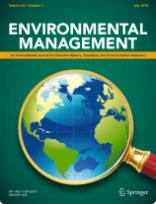
This study intended to understand the extent of climate change coherence across national climate change adaptation planning frameworks, sector policies and national development plans in Tanzania. The findings revealed a weak alignment between national development plans and national climate change response strategies that were attributed to weak alignment between sector policies. However, the study found […]
The effects of COVID-19 pandemic on enrollment rates and gender inequalities in Tanzania
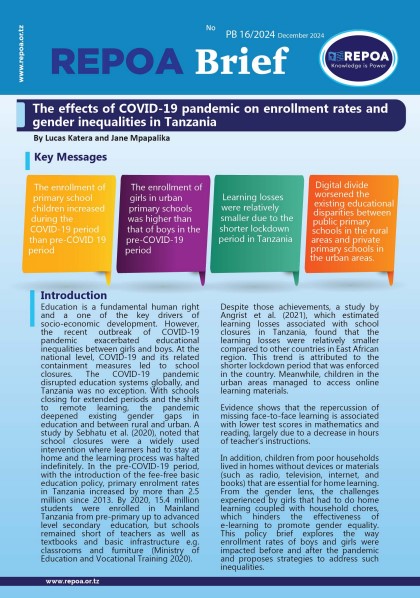
This study compares enrolment in the pre- and post-COVID-19 pandemic. During and after the outbreak of COVID-19 pandemic, enrolment rates rose compared to the pre-COVID-19 period in both public and private schools. Specifically, more girls than boys were enrolled in both Dar es salaam and Dodoma regions. This increase in girls’ enrolment may be attributed […]
How to overcome rent seeking in Tanzania’s skills sector? Exploring feasible reforms through discrete choice experiments
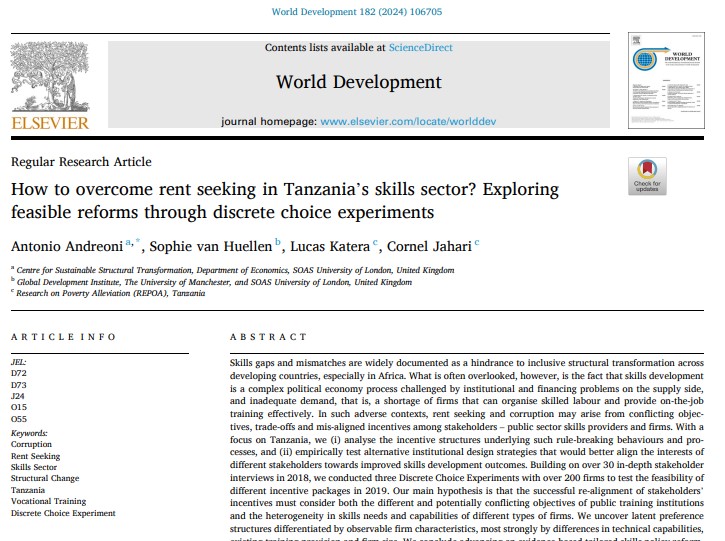
Skills gaps and mismatches are widely documented as a hindrance to inclusive structural transformation across developing countries, especially in Africa. What is often overlooked, however, is the fact that skills development is a complex political economy process challenged by institutional and financing problems on the supply side, and inadequate demand, that is, a shortage of […]
Investing in Tanzania’s People – Valuing the U.S. Tanzania Partnership for Prosperity
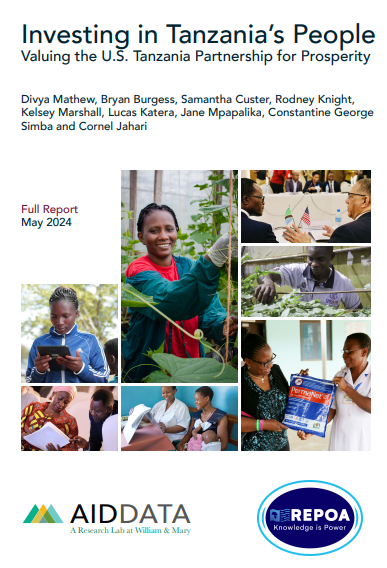
This study was conducted as a collaboration between REPOA and AidData, a U.S.-based research lab at William & Mary’s Global Research Institute. This research was made possible with generous support from the United States Department of State. The findings and conclusions of this report are those of the authors alone and do not necessarily reflect […]
The Impact of the COVID-19 Pandemic on educational Inequalities in Tanzania
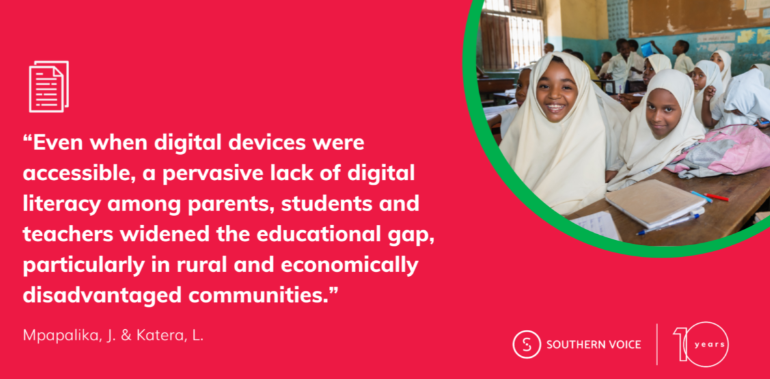
This study examines the impact of COVID-19 on educational inequalities in primary schools in Tanzania, focusing on student enrolment and learning behaviour, teacher engagement, and the application of information and communications technology (ICT), in 26 primary schools. Despite government efforts to provide free education and reduce inequalities, disparities persist, particularly along rural-urban, socio-economic and gender […]
Bargaining Strategies in recent tax reforms in Tanzania
The authors’ motivation for this research and so this Working Paper was on their conceptualisation of revenue bargaining as it hones in on political dynamics whereby the interests and power of members of government and of different revenue providers take center stage. A political settlement approach that conceptualises political dynamics fitting both democratic and non-democratic […]
Learning Environment and Performance
of Primary Education in Tanzania
This policy brief aims at assessing learning outcomes by looking at inputs, commitments and competencies of service providers in the education and health sectors. The survey was conducted in two rounds in 2014 and 2016/17. The two surveys had been preceded by a pilot conducted in 2010 in Tanzania and Senegal, which allows Tanzania to […]
Designing for differences:
aligning incentives in Tanzania’s skills sector
Since the introduction of the Skills Development Levy (SDL) in Tanzania, the financing of skills training has been contested. The private sector has raised concerns about the size of the levy and the usefulness of training provided by VET centres, and has accused the government of misallocation and misuse of the raised levy. Lack of […]
Learning Environment and Performance of Primary Education in Tanzania
Since independence in 1961, Tanzania declared war against three social enemies, which are ignorance, poverty, and diseases. The fight against ignorance was to succeed by giving special attention to the education sector. Thus, throughout the history of Tanzania, education is regarded a key priority for development that impacts the lives of people (Rajani & Omondi, […]
Healthcare Delivery Environment and Performance in Tanzania
Good health is indispensable towards promoting the well-being of people as well as the nation’s development (World Bank, 2016). Tanzania like many other developing countries has marked health as a priority matter that needs much attention – making the country committed to goal 3 of the Sustainable Development Goals of 2030 (Lee & Tarimo, 2018). […]
Designing for differences:aligning incentives in Tanzania’s skills sector
The aim of this paper is twofold. Building on Andreoni (2018), we first aim to evaluate the current incentive structures that cause existing inefficiencies and encourage rule-breaking behaviour. Second, we seek to test empirically a number of institutional design strategies for the sector that would better align the incentives of private- and public-sector stakeholders and […]
Healthcare Delivery Environment and
Performance in Tanzania
The purpose of this policy brief is to assess outcomes of primary education and health services. The survey looked at the inputs, commitments and competencies of service providers in these sectors. The survey was conducted in two rounds in 2014 and 2016/17. The two surveys were preceded by a pilot conducted in 2010 in Tanzania […]
Drivers of Farm Household Incomes in Rural Tanzania
Throughout the history of Tanzania, agriculture has been considered the back bone of its economy. Its contribution to the export earnings has been sizable. Its role in ensuring domestic food security has always been very important. Even more importantly, it employs more than 70% of the population, most ofthem living in rural areas where poverty […]
Elimu na Uzalishaji Kwenye Kilimo Tanzania Vijijini
Hii ni taarifa fupi itokanayo na utafiti wa kitaalam kuhusu mchango wa mfumo rasmi na usiorasmi wa elimu, na upatikanaji wa ardhi na mikopo kwa uzalishaji kwenye kilimo Tanzania katika maeneo ya vijijini. Uchambuzi uliofanywa unasisitiza umuhimu wa elimu rasmi na ile isiyo rasmi, upatikanaji wa ardhi, na uzoefu wa muda mrefu wa stadi za […]